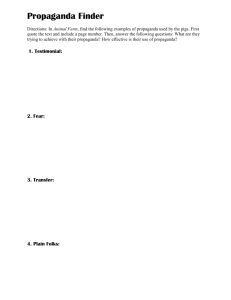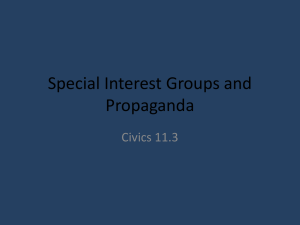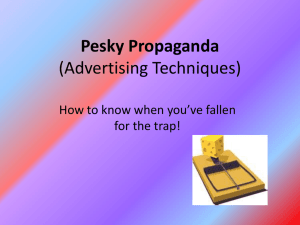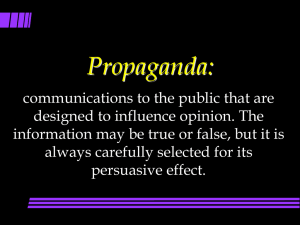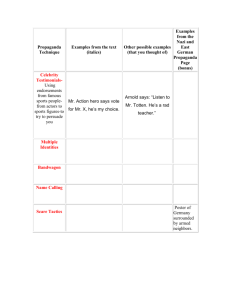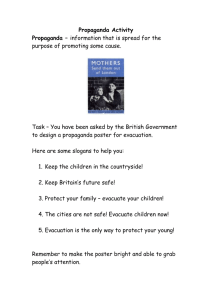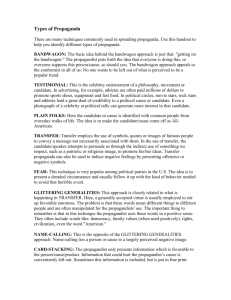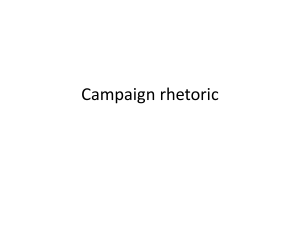Propaganda Terms
advertisement
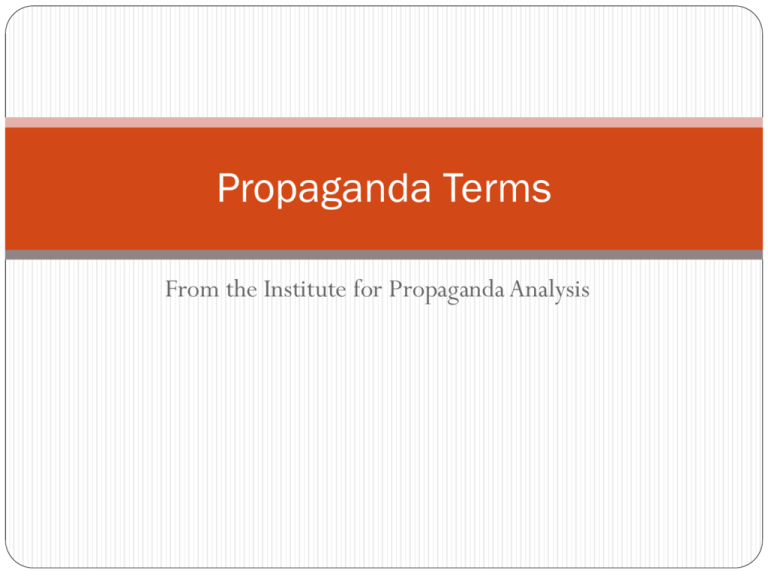
Propaganda Terms From the Institute for Propaganda Analysis What is Propaganda? Any widespread promotion of ideas, doctrines, etc… Why Propaganda? "propaganda" is not inherently a dirty word — it just usually is. Any time you are trying to convince anyone of something, you are using some kind of persuasion, debating, or propaganda technique. Just telling the whole truth about something is one simple propaganda technique, and a highly effective one. But lying often works better, at least with some audiences... Types of Propaganda: Bandwagon Euphemism Fear Glittering Generalities Name-Calling Plain Folks Rewards Testimonial Transfer Bandwagon Bandwagon - is a device that attempts to persuade you that everyone else supports an idea, so you should support it too. Sometimes opinion polls are contrived for this very purpose, such as the so-called "Pepsi Challenge," which claimed that most people preferred the taste of Pepsi over Coca-Cola. "The propagandist hires a hall, rents radio stations, fills a great stadium, marches a million or at least a lot of men in a parade," the IPA observed. "He employs symbols, colors, music, movement, all the dramatic arts. He gets us to write letters, to send telegrams, to contribute to his cause. He appeals to the desire, common to most of us, to follow the crowd." Euphemism Euphemisms - are another type of word game. Rather than attempt to associate positive or negative connotations, euphemisms merely try to obscure the meaning of what is being talked about by replacing plain English with deliberately vague jargon. Rutgers University professor William Lutz has written several books about this strategy, most recently Doublespeak Defined. Examples include the use of the term "strategic misrepresentations" as a euphemism for "lies," or the term "employee transition" as a substitute for "getting fired." Euphemisms have also transformed ordinary sewage sludge into "regulated organic nutrients" that don't stink but merely "exceed the odor threshold." Fear Fear - is a device that attempts to reach you at the level of one of your most primitive and compelling emotions. Politicians use it when they talk about crime and claim to be advocates for law and order. Environmentalists use it when they talk about pollutionrelated cancer, and their opponents use fear when they claim that effective environmental regulations will destroy the economy and eliminate jobs. Fear can lead people to do things they would never otherwise consider. Few people believe that war is a good thing, for example, but most people can be convinced to support a specific war if they believe that they are fighting an enemy who is cruel, inhuman, and bent on destroying all that they hold dear. Glittering Generalities Glittering generalities - is a reverse form of name-calling. Instead of insults, it uses words that generate strong positive emotionswords like "democracy," "patriotism," "motherhood," "science," "progress," "prosperity." Politicians love to speak in these terms. Newt Gingrich advised Republicans to use words such as "caring," "children," "choice," "commitment," "common sense," "dream," "duty," "empowerment," "freedom," and "hard work" when talking about themselves and their own programs. Democrats, of course, use the same strategy. Think, for example, of President Clinton's talk of "the future," "growing the economy," or his campaign slogan: "I still believe in a place called Hope." Name Calling Name-calling - involves the use of insult words. Newt Gingrich, the former Speaker of the U.S. House of Representatives, is reported to have used this technique very deliberately, circulating a list of negative words and phrases that Republicans were instructed to use when speaking about their political opponentswords such as "betray," "corruption," "decay," "failure," "hypocrisy," "radical," "permissive," and "waste." The term "junk science," is an obvious use of this same strategy. When namecalling is used, the IPA recommended that people should ask themselves the following questions: What does the name mean? Does the idea in question have a legitimate connection with the real meaning of the name? Is an idea that serves my best interests being dismissed through giving it a name I don't like? Plain Folks Plainfolks - is a device that attempts to prove that the speaker is "of the people." Even a geeky multibillionaire like Bill Gates tries to convey the impression that he's just a regular guy who enjoys fast food and popular movies. Politicians also use the "plain folks" device to excess: George Bush insisting he eats pork rinds; Hillary Clinton slipping into a southern accent. Virtually every member of the U.S. Senate is a millionaire, but you wouldn't know it from the way they present themselves. Rewards Rewards-This is a type of propaganda that promises a reward in exchange for a set goal. This type of propaganda was used by the United States during the Afghan war. A number of U.S. aircraft made low-flying passes over civilian towns dropping pamphlets and leaflets offering a reward for high-value personnel targets (such as Osama bin Laden). These aircraft jammed local radio stations in the area broadcasting the message also. Testimonial Testimonial - is a specific type of transfer device in which admired individuals give their endorsement to an idea, product, or cause. Cereal companies put the pictures of famous athletes on their cereal boxes, politicians seek out the support of popular actors, and activist groups invite celebrities to speak at their rallies. Sometimes testimonials are transparently obvious. Whenever they are used, however, the IPA recommends asking questions such as the following: Why should we regard this person (or organization or publication) as a source of trustworthy information on the subject in question? What does the idea amount to on its own merits, without the benefit of the testimonial? Transfer Transfer - is described by the IPA as "a device by which the propagandist carries over the authority, sanction, and prestige of something we respect and revere to something he would have us accept. For example, most of us respect and revere our church and our nation. If the propagandist succeeds in getting church or nation to approve a campaign in behalf of some program, he thereby transfers its authority, sanction, and prestige to that program. Thus, we may accept something which otherwise we might reject." In 1998, the American Council on Science and Health convened what it called a "blue-ribbon committee" of scientists to issue a report on health risks associated with phthalates, a class of chemical additives used in soft vinyl children's toys. People familiar with ACSH's record on other issues were not at all surprised when the blue-ribbon committee concluded that phthalates were safe. The committee's real purpose, after all, was to transfer the prestige of science onto the chemicals that ACSH was defending.
